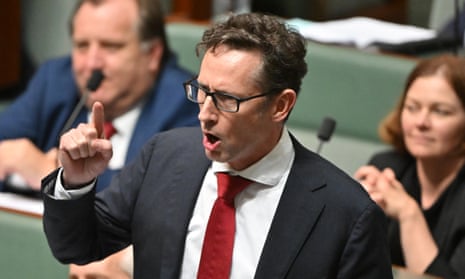The Labor government will push ahead with a new compensation scheme for victims of financial misconduct, refusing to water down civil penalties for the finance sector, and rejecting a claim it would give the responsible minister “god-like powers” to punish banks.
The assistant treasurer and minister for financial services, Stephen Jones, said the government’s financial accountability regime was “locked and loaded” and will not be changed, and rejected Liberal senator Andrew Bragg’s call to have parliament determine the scope of a new levy on financial industry members that will pay for the scheme.
The Australian Banking Association has raised concerns that the financial services compensation scheme of last resort levy will apply to deposit-taking institutions, including those that do not primarily give financial advice.
The biggest impact is believed to be on AMP, which drastically scaled back its financial advice functions after criticism from the Hayne royal commission.
In its submission to the parliamentary inquiry, the ABA supported the proposed financial accountability regime, the compensation scheme of last resort and the levy to pay for it – subject to a qualification it said would give greater “certainty” about institutions’ exposure.
Bragg, who was deputy chair of a parliamentary inquiry into the legislative package, has flagged a further fight on oversight of which institutions are captured by the levy.
Bragg said “the lack of parliamentary scrutiny is a major issue” that could be remedied by amendments so the bill, not ministerial regulation, determined who pays the levy.
“Consideration should be given to improving the bill with permanent transparency measures … to give more certainty about how this massive levy will work.”
“I don’t think we should give the minister god-like powers.”
Bragg said he didn’t want to weigh into financial industry debates about who pays the levy, but the parliament owes the sector “a cause and effect duty” – meaning that companies responsible for the need to pay financial compensation, are the ones who pay the levy.
Jones dismissed this concern, explaining that the compensation scheme of last resort legislation is “exactly the same” as was introduced by the Morrison government.
“That’s presumably the same legislation that Andrew Bragg voted on in his party room.
“So, if he’s concerned about god-like powers, perhaps he should look through his diary notes and ask whether he asked the same question of his own prime minister.”
after newsletter promotion
The financial accountability regime bill imposes obligations on key personnel of entities in the banking, insurance and superannuation industries, including to conduct their business with honesty and with care, skill and diligence.
Failures of the accountability obligations and the requirements to notify regulators are backed by penalties of up to $1.1m for individuals – for deliberate breaches or failures to follow directions -or $11.1m for corporations.
A spokesperson for ABA denied lobbying to remove civil penalties from the regime.
“The ABA welcomes the key provisions of the bill to strengthen individual accountability and transparency in the financial system by setting out accountability obligations for directors and senior executives,” the ABA said in its submission.
Jones said there would be “no changes” to the financial accountability regime. “We’re not taking [civil penalties out] – it’s locked and loaded legislation that is before the parliament.”
On Wednesday Bragg successfully moved in the Senate to require the Australian Financial Complaints Authority, which will administer the compensation scheme, to attend Senate estimates in November.
